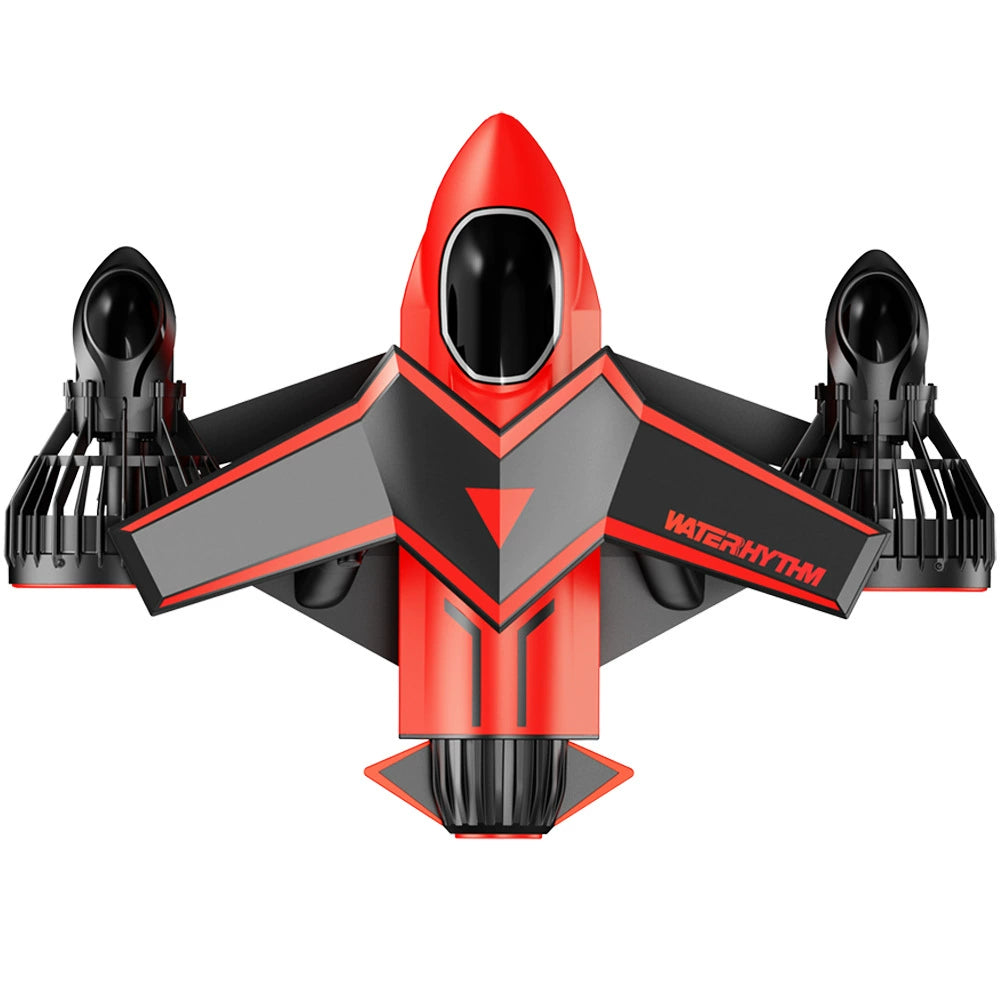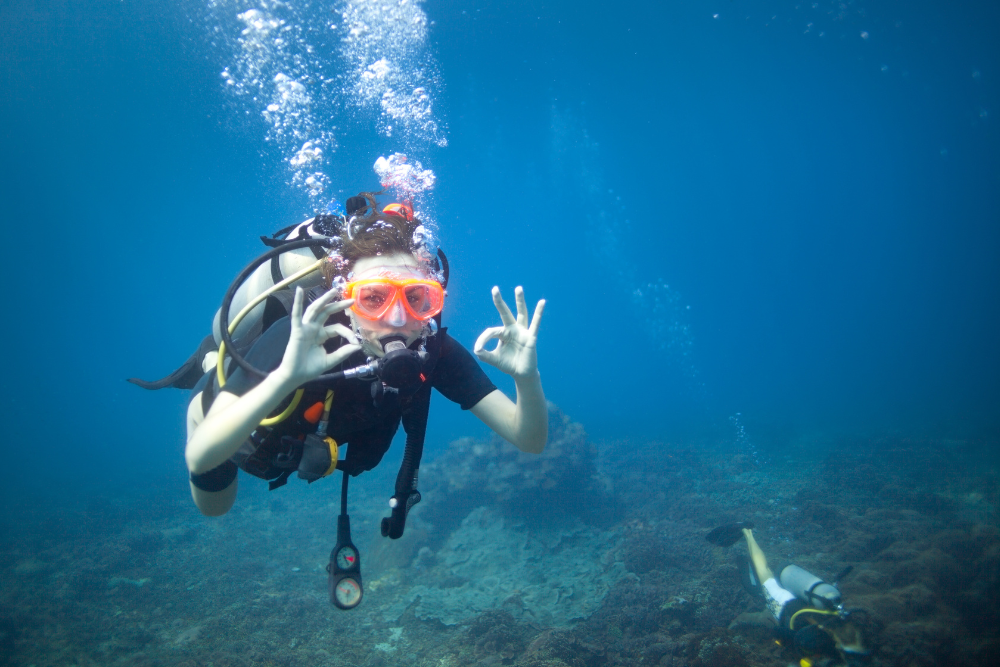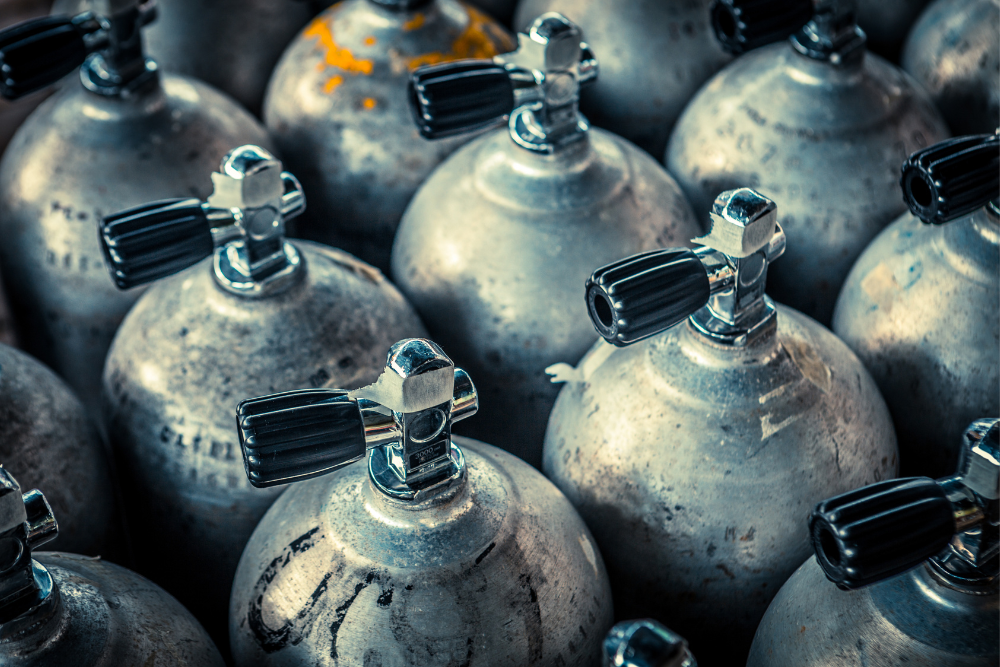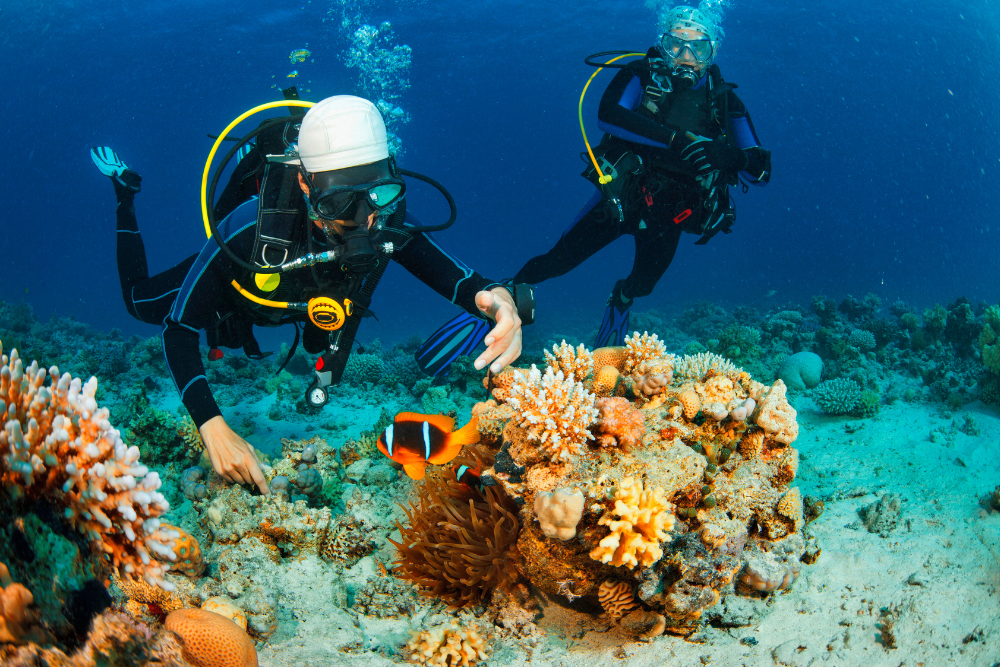Scuba diving typically refers to recreational diving within established depth limits. Divers use compressed air in standard tanks (aluminum 80 cu ft is common) and wear wetsuits or drysuits. Certification (e.g., PADI Open Water) allows dives down to 18 meters/60 feet, progressing to 40 meters/130 feet with Advanced training. No decompression stops are usually needed within no-deco limits. Dives often last 45-60 minutes.
Deep-sea diving (or technical diving) explores significantly deeper or longer than recreational scuba. It requires specialized gas mixtures (nitrox, trimix, heliox) to manage oxygen toxicity and nitrogen narcosis risks beyond 40 meters/130 feet, multiple tanks, rebreathers, and extensive planning for mandatory decompression stops. Technical certifications (e.g., TDI Decompression Procedures) are essential. Divers target depths of 60+ meters/200+ feet or penetrate wrecks/caves far from direct ascent.
Gear Differences
Think of recreational scuba as exploring your local pond – the gear is straightforward. Divers typically use a single aluminum 80 cubic foot (11.1L) tank filled to 200 bar (3000 psi), weighing around 31 kg (68 lbs) when full. Breathing standard compressed air (21% O₂), this setup lasts 45-60 minutes on a 18m (60ft) reef dive in 24°C (75°F) water, where a 5mm neoprene wetsuit suffices. Contrast this with deep-sea diving, where ambient pressure at 60m (200ft) hits 7 bar, requiring larger steel twin 12L tanks at 230 bar, weighing over 50 kg (110 lbs) dry. Here, divers breathe custom trimix gas blends (e.g., 15% O₂, 40% He, 45% N₂) and wear drysuits with 400g insulation to withstand 4°C (39°F) temperatures, managing mandatory decompression stops lasting 30+ minutes.
The recreational standard aluminum 80 holds just 11.1L water volume, but delivers 2,264L breathable gas at surface pressure. At 20m depth (3 bar ambient pressure), consumption triples, so a diver with an average surface air consumption (SAC rate) of 20L/min will consume 60L/min. This gives about 37 minutes bottom time at 20m after reserving 500 psi/50 bar for ascent/safety. Deep divers carry vastly more gas: twin steel 12L tanks charged to 230 bar hold 5,520L total, often supplemented by stage/deco tanks like aluminum 40s (≈1,100L each). Why? At 60m depth (7 bar ambient), that same 20L/min SAC rate burns 140L/min, plus 30-50L/min for additional gear like scooters/lights. With mandatory decompression averaging 1 minute per meter below 30m, a 60m dive requires ≈60 minutes decompression stop time, consuming another 4,000+ liters of 50% nitrox deco gas carried separately.
Recreational setups use simple open-circuit regulators dumping all exhaled gas. Deep divers often switch to closed-circuit rebreathers (CCRs) recycling exhaled O₂, reducing gas weight by 70-80%. A CCR’s small 3L counterlung replaces bulky tanks but adds complexity, requiring dual O₂ cells monitored every ≤5 minutes. Thermal protection scales with depth and duration: a 5mm wetsuit (R-value ≈3.5) handles ≥18°C water but loses effectiveness below 15m/50ft as pressure compresses neoprene. Drysuits with 200-400g Thinsulate™ undergarments (R-value ≈6-8) trap warm air, enabling dives below 4°C but require pressure-compensated valves to maintain loft at 60m. Finally, life-critical redundancy differs: recreational BCs have ≤15kg lift, while deep diving wings offer 45kg+ lift plus dual dive computers tracking CNS oxygen toxicity (max 300% CNS per dive) and required decompression down to ±1 minute accuracy.
| Feature | Recreational Scuba | Deep-Sea Diving |
|---|---|---|
| Tank Capacity | Single 80 cu ft (2,264L) | Twin 12L (5,520L) + deco bottles |
| Gas Consumption at 60m | N/A (rare) | 140L/min baseline |
| Water Temp Range | 18°C+ (5mm wetsuit) | ≤4°C (drysuits + 400g insulation) |
| Decompression Time | None at ≤18m | ≥1min/m depth past 30m |
| Depth Pressure | 3 bar at 20m | 7 bar at 60m |
| Oxygen % Limits | Max 40% O₂ (Enriched Air) | 12-18% O₂ (trimix helium blends) |
| Gear Weight | 31kg tank-only | ≥50kg for core tanks/rebreather |
| Computer Monitoring | NDL timers | Dual CNS/deco tracking (±1min) |

Where You Dive
Recreational scuba divers stick to shallow ecosystems accessible within no-decompression limits, with 80% of reef dives occurring between 5-18m (16-60ft) in 24-30°C (75-86°F) tropical waters like Indonesia’s Coral Triangle, where visibility averages 20-40m (65-130ft). In contrast, deep-sea diving targets submerged structures below 30m (100ft), like WWII shipwrecks resting at 40-90m (130-300ft) depths in temperate zones such as the Great Lakes, where bottom temperatures plunge to 4-10°C (39-50°F), visibility drops to 5-15m (16-50ft), and the current velocity frequently exceeds 1.5 knots – demanding advanced drift diving techniques.
Shallow reef systems thrive in the photic zone (≤30m/100ft) where sunlight fuels coral growth; most reefs plateau at ≤15m/50ft, covering <1% of the ocean floor but supporting 25% of marine species. Divers here typically cover 300-500m horizontal distances on 60-minute dives, encountering topography with ≤20m/65ft vertical relief like the Great Barrier Reef’s pinnacles. Visibility correlates tightly with depth: at 10m, tropical reefs average 30m visibility (range 15-50m), while at 3m shallows, sedimentation slashes visibility to 5-10m. Conversely, deep wrecks like the RMS Rhonda rest at 55m/180ft, requiring 120-minute total runtime for just 20 minutes bottom time, navigating structures spanning ≥100m length with 20-30m vertical drops – the SS Thistlegorm’s wreck measures 128m long×20m high at 30m depth, while the Andrea Doria’s hull lies crushed at 73m/240ft. Environmental hazards diverge drastically: reef dives face ≤1 knot currents and 27-30°C thermoclines, while deep wreck penetration introduces zero visibility siltouts with ≤0.5m overhead clearance, compounded by 4-6°C thermal gradients across decks and interior spaces. Atmospheric pressure escalates nonlinearly with depth – recreational divers experience 2.8 bar at 18m, but deep wreck explorers endure 7.9 bar at 70m, exponentially increasing gas toxicity risks. Biodensity metrics show reefs host 500+ fish species per hectare, whereas deep wrecks average <50 macro species per site but attract pelagics like 3m sand tiger sharks hunting at 40m thermoclines.
Quantitative Contrast Table:
| Parameter | Shallow Reefs | Deep Shipwrecks |
|---|---|---|
| Typical Depth Range | 3-18m/10-60ft (peak density 5-12m) | 30-90m/100-300ft (60% between 40-60m) |
| Bottom Temp Range | 24-30°C/75-86°F (≤1°C drop per 10m) | 4-10°C/39-50°F (7°C drop per 30m depth increase) |
| Structure Height/Length | ≤20m height/200m length (coral heads ≤5m) | ≥15m height/100m length (SS Thistlegorm: 128m×20m) |
| Annual Dives per Site | ≥5,000 (e.g., Molasses Reef, FL) | ≤300 (e.g., SS Yongala, Australia) |
| Visibility Range | 15-50m/49-164ft (diurnal variation ±35%) | 5-20m/16-65ft (silt reduces penetration <1m) |
| Current Speed | 0.3-1.2 knots (steady trade wind-driven) | 1.0-3.0 knots (unpredictable eddies/tidal surges) |
| Water Density | 1.022-1.027 g/cm³ (tropical salinity) | 1.028-1.032 g/cm³ (colder/higher salinity) |
| Thermocline Gradient | ≤1°C drop per 5m (minor strata shifts) | ≥3°C drop per 10m (distinct layers below 30m) |
| Species Density | >400 macro organisms per 100m² | <50 macro organisms per 100m² |
Reef navigation relies on natural contours with ≤10% slope gradients, while wreck penetration mandates ≤50m linear distance from exit points using guideline reels. Deep sites require ±5-minute decompression stops per meter below 30m, turning a 25-minute bottom time at 50m into a 95-minute dive with 40 minutes of mandatory stops – all while managing exposure in <10°C water that drains body heat at ≥300 watts/m², versus ≤50 watts/m² heat loss on reefs. Surface conditions differ too: reef sites average ≤0.6m wave heights with <5% probability of storms during charter windows, while deep wreck expeditions face 1.5m average swells and ≥20% weather cancellation rates.

Short Reef Visits vs. Complex Deep Dives
Divers surface before consuming >85% of their tank pressure or hitting ≤5 minutes on their NDL timer at 18m/60ft. Typical operations use single gas (21-32% O₂), require ≤15-minute site briefings, and allow ±3m depth deviation from planned profiles. Deep dives demand multi-phase gas planning - divers calculate trimix blends (e.g., 18/45 He/O₂), schedule mandatory stops every 3m below 30m, and pack ≥3 times the gas volume to handle ≥20% contingency reserves for currents consuming 25L/min extra.
Depth-Time-Gas Triad Analysis
• Recreational: Maximum depth governs all planning. At 12m/40ft, NDL is 140 minutes, but divers surface by 60 minutes consuming ≤1,200L gas from their single tank. Deviation tolerance allows ±10% time error with minimal risk. Surface intervals last ≥50 minutes to reduce nitrogen loading to ≤30%. Dive profiles maintain <5m vertical oscillation.
Deep Technical: At 60m/200ft, ambient pressure reaches 7 bar, forcing strict protocols:
- Bottom time capped at 25 minutes to limit nitrogen absorption to ≤70% M-value.
- Descent/ascent speeds controlled to ≤9m/min descent, ≤3m/min ascent from 21m.
- Trimix 15/55 carried in twin 12L tanks at 220 bar delivers 2,100L gas, burned at 140L/min totaling 3,500L consumed during dive.
- Mandatory decompression begins at 21m/70ft with 4-minute stops every 3m, peaking at 45 minutes at 3m requiring 1,800L pure O₂ from separate deco tanks.
Risk Mitigation Parameters
| Parameter | Recreational Value | Technical Value |
|---|---|---|
| O₂ Exposure Limit | 1.4 PPO₂ max (≥99% adherence) | 1.2 PPO₂ working (≤1.6 peaks) |
| CNS% Tolerance | ≤150% | ≤180% with ≥90min surface reset |
| Contingency Gas | 50bar reserve (≈500L) | Full deco bottle + 1,000L bailout |
| Failure Redundancy | Single computer (95% usage) | Triple redundancy (2 computers + tables) |
| Wave Height Limit | ≤0.8m (90% dive completion) | ≤1.5m (requires DP ship systems) |
| Navigation Error | ≤30m radial (sonar markers) | ≤5m (fractional 0.1° GPS + shot lines) |
Environmental Adaptation Requirements
Reef plans adjust for ≤1.5 knot currents by adding 10% gas reserves, while deep dives combat 2.5-3 knot downcurrents in trenches requiring 45° ascent angles and +40% gas volume. Thermal planning diverges: tropical divers lose ≤300 kcal/hr in 26°C water vs. technical divers burning ≥600 kcal/hr in 6°C water despite 350g undergarments - necessitating carb-loading diets ≥500g/day. Visibility expectations shift from 25m average on reefs to ≤8m in silted wrecks, dropping light intensity by 90% at 50m and demanding ≥10,000 lumen primary lights with ≥120min burn times.
Basic Certifications vs. Advanced Deep Skills
Recreational scuba certifications like PADI Open Water require 24 hours total training, including ≤6m confined water sessions and 4 open-water dives limited to 18m depth, with students demonstrating 12 core skills like mask clearing ≤30 seconds in ≥15°C water. Technical deep diving mandates 100+ hours across multiple courses (e.g., TDI Decompression Procedures), demanding ≥50 logged dives with 10+ hours practicing failures at ≥30m, where trainees must execute gas switches within ±0.5% O₂ accuracy while managing simulated rebreather faults in <8°C water with ≤3m visibility.
▼ Skill Proficiency Benchmarks
• Buoyancy Control: Recreational standards allow ±1m depth deviation in mild currents; technical divers maintain ±0.3m precision during 90-minute decompression hangs while managing >40kg gear weight shifts from tank swaps.
• Emergency Response: Open Water tests buddy-assisted ascents at 1.5m/sec; advanced tech requires solo bailout from 45m within 35 seconds using redundant systems after complete gas loss simulations, including rebreather shutdowns ≤10 seconds with <2L/min gas leakage tolerance.
• Navigation Error Margins: Reef navigation permits ≤15m course error over 300m swims; wreck penetration certification fails students exceeding ±2m drift through 80m overhead passages with ≤0.5m clearance constraints.
◉ Course Structure Metrics
| Parameter | Recreational (OWD) | Technical (Trimix Diver) |
|---|---|---|
| Minimum Age | 10 years | 18 years + 100 dives |
| Theory Hours | 8 hours (80% exam pass) | 40 hours (≥90% exam pass) |
| Water Sessions | 5 (max 4:1 student ratio) | 16 (max 2:1 student ratio) |
| Depth Validation | 4 dives ≤18m | 8 dives ≥40m with deco |
| Night/Low-Viz Training | Optional specialty (≤3h) | 6hrs mandatory (≤1m vis) |
| Gear Configuration Drills | 3 equipment checks | 18 pre-dive checklist steps |
| Failure Simulations | Flooded mask/reg retrieval | Dual regulator failures + CO₂ scrubber breakthrough |
◇ Physiological Conditioning
Recreational buoyancy skills occur in ≥20°C water with 6kg weights; drysuit/tech certifications require ≥20 dives ≤10°C while managing 25kg gear loads, where trainees maintain core temperature ≥35°C despite >500W heat loss rates for 120+ minute immersions. Cognitive testing reveals tech candidates process 2.8x more data points – monitoring PPO₂ ±0.05 bar, ΔP He/N₂ gradients, and deco algorithm variance while managing ≥4 simultaneous tasks.
◼︎ Certification Costs & Time
- Open Water: $550 USD over 4 days | Materials: 1 textbook, e-learning code, logbook
- Trimix Diver: 3,200 USD over 21 days | Materials: 5 manuals, decosoftware license, digitalCO2 analyzer (1,100 value)
- Instructor Ratios: Recreational: ≤8 students/instructor | Tech: ≤2 students/instructor + dedicated safety diver ($150/day)
- Failure Rates: OWD: ≤12% | Advanced Tech: ≥35% (He/O₂ management errors cause 68% failures)
- Skill Refresh Frequency: Rec divers retrain every 5 years (6hr refresher); tech divers requalify every 12 months with 4 checkout dives ≥30m
◍ Risk Threshold Comparison
Recreational training assumes <1% probability of needing bailout gas; tech courses prepare for ≥15% probability scenarios where multiple systems fail simultaneously during 180ft wreck penetrations. Depth progression rates differ: Open Water students reach 9m within 10 minutes during dive 1; tech trainees spend ≥8 hours between 3-6m mastering buoyancy before advancing beyond 30m.
◔ Skill Retention Data
Unpracticed recreational divers lose 40% proficiency in buoyancy/emergency skills after 18 months inactivity, whereas tech divers maintain ≥85% precision due to 250+ practice hours annually drilling with ±1% gas analysis calibration standards and quarterly dry-run simulations ≥4 hours each. Visual acuity requirements also diverge: recreational accepts 20/40 corrected vision; technical mandates 20/20 uncorrected vision ≥5m to read tiny rebreather cell displays (8pt font) in darkness.

Who Does Each Kind?
Recreational scuba caters to >1.2 million new divers annually, mostly tourists aged 15-65 holding basic PADI Open Water certification requiring 3-day training (400-600 USD) and medically clearing BMI ≤30 with resting HR ≤100bpm. Contrastingly, deep-sea diving attracts <8,000 active technical divers globally, typically professionals aged 28-55 investing 12,000+ in training across 5 certifications, maintaining peak O2 consumption ≤25 ml/kg/min to endure 3-hour dives carrying >45kg gear. Recreational operations require ≤2M liability coverage, while commercial deep contractors carry ≥$20M policies for projects at >150m depths.
Recreational:
Age distribution peaks at 32±8 years, with 67% vacation divers completing <10 dives/year
Max depth tolerance: 18m without penalties (99% adherence), health standards accept controlled hypertension ≤160/100 mmHg
Budget allocation: 1,200 USD annual spend on charters(65-125/dive), gear leases(30-45/outing)
Average body composition: 29% body fat tolerance, capable of swimming 200m freestyle ≤6:30 minutes
Technical:
Age median: 41 years ±6 years, requiring ≥50 logged dives showing ≤1% DCS incidence rate
Physical screening: VO₂ max ≥42ml/kg/min, stretch reflex latency ≤50ms, static apnea ≥2:30 minutes
Financial commitment: 6,000-8,000 gear ownership (rebreathers 5k-15k), 300-900/dive helium costs
Bodily strain limits: Can withstand core temp drops to 35°C losing ≥600 kcal/hr in <10°C water
◆ Certification Pathways
| Credential | Recreational Tiers | Deep Technical Tiers |
|---|---|---|
| Entry | Open Water Diver: $525 USD, 4 dives | Advanced Nitrox/Deco Procedures: $1,200 USD, 8 dives |
| Intermediate | Advanced OW: 5 dives to 30m | Trimix Diver: $1,800 USD, 6 dives >45m |
| Leadership | Divemaster: $950 USD, 10 assessments | CCR Instructor: $3,500 USD, 100hrs mentoring |
| Medical | Physician approval q60mo | Cardiologist/HRV tests q12mo |
| Recertification | None required | Skills validation q12mo (4 dives ≤45m) |
■ Operational Prerequisites
Recreational operators demand ≤0.5% incident rates using 6-point predive checks and requiring surface visibility ≥1km. Divers self-limit depths based on subjective comfort ≥80% – only 17% exceed 24m without Advanced certification. Commercial deep diving mandates DNV-certified saturation systems capable of 28-day lockouts when servicing oil rigs at 300m, with teams requiring:
- ≥3-year offshore survival training
- Hyperbaric rescue affiliations ≤90min response
- $3.5M minimum life insurance policies
- Daily cognitive tests scoring ≥92% on reaction time benchmarks
◼ Participation Barriers
| Variable | Recreational Constraints | Technical Constraints |
|---|---|---|
| Time Investment | 28±4 hours training | 400±60 hours training/skills drills |
| Failure Rates | 11% dropout (mostly buoyancy issues) | 42% course attrition (gas math/physiology) |
| Gear Weight Limits | Lift capacity ≥15kg BCs | ≥50kg counterweight systems |
| Logistics Scalability | Boats carry 24 divers (max depth 30m) | Saturation chambers hold 6 divers (max depth 500m) |
| Certified Instructor Ratio | 1:8 students | 1:2 students + 2 safety divers |
● Commercial vs. Recreational Operations
Recreational dive tourism drives 4.6B annual revenue from >500 resort operators, requiring ≤120K liability policies per boat. Technical diving serves scientific (35%), industrial (50%), military (15%) sectors, with saturation divers earning 30,000-100,000 per month depending on depth:
- 50-100m: 1,200-2,000/day for pipeline inspection
- 100-200m: 2,500-4,000/day welding operations
- >200m: 6,000-12,000/day deep-sea cable repair
Training facilities differ radically: rec resorts use ≤12m training pools heated ≥26°C, while technical centers operate ≥8m dive towers chilling water to 4°C with purpose-built silt generators reducing visibility <0.5m to simulate wreck conditions. Medical disqualification affects <3% recreational candidates versus ≥18% technical applicants failing stress ECG abnormalities at simulated 60m pressures.





Leave a comment
All comments are moderated before being published.
This site is protected by hCaptcha and the hCaptcha Privacy Policy and Terms of Service apply.